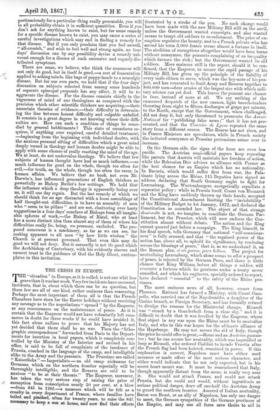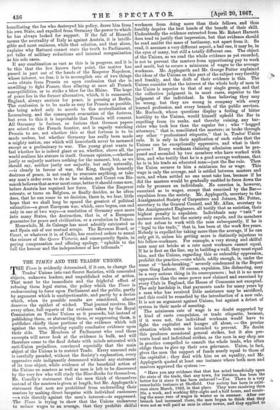THE CRISIS IN EUROPE.
THE "situation" in Europe, as it is called, is not one whit less grave than it was last week. Very few incidents have occurred, incidents, that is, about which there can be no question, but those few are all of one kind, rather ominous than reassuring. Perhaps the most important of them all is that the French Chambers have risen for the Easter holidays without receiving any message as to the negotiations " opened " by the Emperor, or any reassurances on the maintenance of peace. As it is certain that the Emperor would not have voluntarily left com- merce in doubt for three weeks if he could have avoided it, this fact alone suffices to prove that his Majesty has not yet decided that there shall be no war. Then the "litho- graphic correspondence" forwarded from Paris to the Depart- ments for insertion in local papers, which is completely con- trolled by the Ministry of the Interior and revised in his office, is said to be full of complaints of the insolence of Prussia, couched in the language of the camp, and intelligible alike to the Army and the peasants. The Prussians are called " Kaiserlichs " — Imperialists -- an old camp nickname for Germans, which on the northern frontier especially will be thoroughly intelligible, and the Zouaves are said to be anxious " to be at their throats." The Emperor, moreover, has taken the very serious step of raising the price of exemption from conscription nearly 50 per cent. at a blow —from 841. to 1201.—a measure which will be felt as a cruelty in every department of France, where families have toiled and pinched, often for twenty years, to raise the 841. necessary to keep a son at home, and now find their efforts frustrated by a stroke of the pen. No such change would have been made with the new Military Bill still on the anvil, unless the Government wanted conscripts, and also wanted means to tempt old soldiers to re-enlistment. The price of ex- emption regulates the bounty, and to a French private.who has served his term 3,000 francs seems almost a fortune in itself. The abolition of exemptions altogether would have been borne without annoyance, the peasants complaining of an inequality which favours the rich ; but the Government wanted its old soldiers. More ominous still is the report, should it be con- firmed, that the Emperor, to secure the rapid passage of his Military Bill, has given up the principle of the liability of every male citizen to serve, which was the key-note of his pro- ject, and has consented to limit Army and Reserve together to 800,000 men—four armies of the largest size with which mili- tary science can yet deal. This leaves the peasant one chance in four, instead of none at all. We say nothing of the rumoured despatch of the new cannon, light breech-loaders throwing from eight to fifteen discharges of grape per minute, to the North, except that the Government, when challenged, did not deny it, but only threatened to prosecute the Avenir National for "publishing false news ;" that it has not pro-- scouted, and that the Courrier de Lyons repeated the same story from a different source. The Bourse has not risen, and in France Ministers are speculators, while in French society the irritated annoyance at Prussian pretensions seems ever to increase.
On the German side, the signs of the hour are even less pacific. The Austrian semi-official papers keep repeating like parrots that Austria will maintain her freedom of action, while the Bohemian Diet advises an alliance with France as the best chance for an Empire which has no nationality.
In Bavaria, which would suffer first from war, the Pala- tinate lying across the Rhine, 115 Deputies have signed an address declaring that South Germany ought to fight for Luxemburg. The Wurtemburgers energetically repudiate a separatist policy ; while in Prussia itself, Count von Bismarck and the King have suddenly thrown up their hands, accepted the Constitutional Amendment limiting the " inviolability " of the Military Budget to 1st January, 1872, and declared the Constitution as amended law. The object of that strange dend-volte is not, we imagine, to conciliate the German Par- liament, but the Prussian, which will now endorse the Con- stitution almost without debate. The nation and the King cannot quarrel just before a campaign. The King himself, in his final speech, tells Germany that national " self-conscious- ness " is fully aroused, and that " the regained power of the nation has, above all, to uphold its significance, by rendering secure the blessings of peace," that is, as we understand it, on the Roman plan, si vis pacem, para helium. The project for neutralizing Luxemburg, which alone seems to offer a prospect of peace, is rejected by the German Press, and there is little chance that King William, before all things a soldier, will evacuate a fortress which he garrisons under a treaty never cancelled, and which his engineers, specially ordered to report, have declared " essential " to the safety of the Rhine pro- vinces.
The most ominous news of all, however, comes from Florence. Rattazzi has formed a Ministry, with Count Cam- pello, who married one of the Napoleonida3, a daughter of the Canino branch, as Foreign Secretary, and has formally refused to divulge the reasons for the Ministerial change. Ricasoli was " struck by a thunderbolt from a clear sky," and it is difficult to doubt that it was levelled by the Emperor, whose firs£ object in any war upon the Rhine must be to neutralize Italy, and who in this war hopes for the ultimate alliance of the Hapsburgs. He may not secure the aid of Italy, though the price he could offer is great,—Rome and an Austrian guaran- tee ; but he can secure her neutrality, which was imperilled so long as Ricasoli, who ordered Cialdini to invade Venetia after the French flag had been hoisted, remained in power. If this explanation is correct, Napoleon must have either used menaces or made offers of the most serious character, and either would indicate that he not only expected, but in his secret heart meant war. It must be remembered that Italy, though apparently distant from the scene, is really very near it. She would not attack France, and could not attack Prussia, but she could and would, without ingratitude or serious political danger, draw off one-half the Austrian Army to guard the southern frontier. Assured of Italian neutrality, Baron von Beust, as an ally of Napoleon, has only one danger to meet, the German sympathies of the German provinces of the Empire, and may use all force save theirs to aid in humiliating the foe who destroyed his policy, drove him from his own State, and expelled from Germany the power to which he has always looked for support. If the fall of Ricasoli means the neutrality of Italy as against Austria, it is intelli- gible and most ominous, while that solution, and that alone, explains why Rattazzi cannot state the truth to Parliament, yet talks of military reductions and internal reorganization as his sole cares.
If any combination as vast as this is in progress, and it is 'to this that the few known facts point, the matter has passed in part out of the hands of the Emperor Napoleon, whose interest, we fear, it is to accomplish one of two things —to obtain from Prussia an open confession that she is unwilling to fight France, thus allaying at once all French susceptibilities, or to strike a blow for the Rhine. The hope of peace lies in the former alternative, which, it is rumoured, England, always anxious for peace, is pressing at Berlin. The confession is to be made as easy for Prussia as possible, she being asked only to accede to the. neutralization of Luxemburg, and the consequent evacuation of the fortress, but even to this it is improbable that Prussia will consent. All Germany is furious, so furious that German papers are seized on the French frontier, and is eagerly watching Prussia to see, not whether this or that fortress is to be made useless, but whether Germany has really been made a mighty nation, one which will henceforth never be menaced except as a preliminary to war. The young giant wants to Teel whether he is indeed giant or no, whether, above all, the world realizes his stature to itself. German opinion,—whether justly or unjustly matters nothing for the moment, but, as we should say, neither justly nor unjustly, but only naturally, —is clearly in favour of war, the Bing, though honestly desirous of peace, is not ready to evacuate anything, or take -any man's order even to do as he wishes, and Count von Bis- marck believes that as war must come, better it should come now, before Austria has regained her force. Unless the Emperor retreats, or turns on Belgium, or finally decides, as he often does, that he can come to no decision, there is, we fear, little hope that we shall long be spared the greatest of political calamities—a great European war, which, once begun, can end only in one of two ways—a resolution of Germany once more into many States, the destruction, that is, of a European guarantee for peace and civilization, or a revolution in France.
Meanwhile, M. de Calonge has most adroitly extricated us and Spain out of our mutual scrape. The Revenue Board, or Court, or whatever it is, of Cadiz, has received orders to annul the seizure of the Queen Victoria, and consequently Spain, in paying compensation and offering apology, " upholds to the lull the honour and the independence of her tribunals."































 Previous page
Previous page